【BBC六分钟英语】你喜欢你的茶吗?
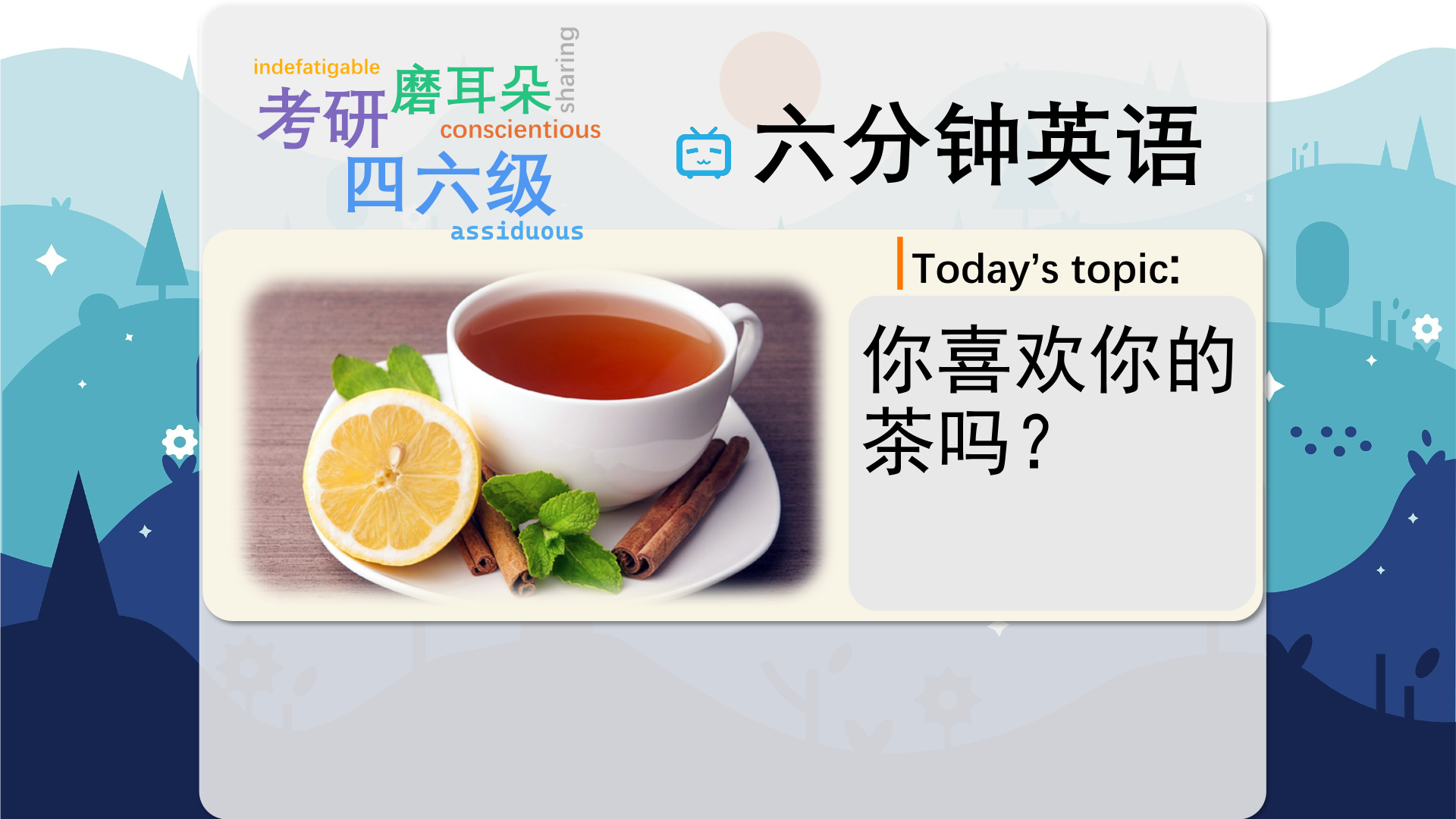
【英文脚本】
Alice
Hello and welcome to 6 Minute English. I’m Alice…
Neil
And I’m Neil… Um… Alice. What’s this?
Alice
It’s a cup of tea, Neil. Would you like some?
Neil
Oh, I can’t drink that! You didn’t let the tea brew for long enough. And you forgot to add sugar.
Alice
Well, make it yourself next time! And when you brew a cup of tea, by the way, you add boiling water to tea leaves or a teabag and allow the flavour to develop.
Neil
I’m sorry, Alice. I didn’t mean to be rude about your tea. But I do like it very strong and sweet.
Alice
Tea is the subject of today’s show. And Neil, I think you’d like the way they serve tea in India. They drink chai, a strong black tea served with lots of milk, sugar and spices.
Neil
Mmm… that does sound good. I quite fancy a cup of chai now.
Alice
Did you know that it was the British who introduced tea to India?
Neil
No, I didn’t, Alice. This is very interesting… I’m proud of our habit of having tea all the time and teabags are great! A marvellous little invention!
Alice
Yes, I agree. Well, that’s my question for you today. Where was the teabag invented? Was it in … a) China b) the US Or c) Britain
Neil
Hmm. I buy a lot of teabags but I don’t know their history. So I’m going to guess c) Britain.
Alice
Well, we’ll find out if you chose the right answer later on. Let’s listen now to Professor Markman Ellis talking about the Chinese tea plant. He’s a historian at Queen Mary, University of London.
Professor Markman Ellis, historian, Queen Mary, University of London
Tea is a shrub that grows naturally in the mountainous areas of China and several thousand years ago, no one knows how exactly, there… I mean… there are stories… it became clear that if you consumed the leaves of this plant especially the younger leaves, then it had an interesting effect on you. And that effect could be thought of as medicinal or it could be thought of as just kind of sanative, making you feel a bit better than you used to feel.
Alice
Professor Markman Ellis tells us that people in Ancient China consumed, or ate, leaves from the tea plant and it had an interesting effect on them.
Neil
Professor Ellis says tea has a sanative effect, making you feel better, so I might try munching a few leaves later on.
Alice
Alright then. Apparently the Chinese started drinking tea because of its medicinal, or healing, qualities. And they’ve been drinking tea for thousands of years! Well we British may love a good cup of tea, but we haven’t been brewing it for nearly so long as the Chinese.
Neil
But remember that tea actually grows in China, Alice. We don’t grow it in Britain.
Alice
Good point, Neil. Which brings me back to what we were talking about earlier. In the 19th century the British started to grow tea in India in order to compete with Chinese tea production. When tea first arrived in Britain in the 17th century it was incredibly expensive and only the elite could afford to drink it.
Neil
Elite means a small group of people in society who have money and power. Well, the opposite is true today, everyone drinks tea! And cheap teabags make really strong tea – just the way I like it!
Alice
[noise of disgust] Oh, it’s not for me! I like tea with a delicate flavour, Lapsang Suchong is my favourite with its evocative fragrance.
Neil
Not teabags, then?
Alice
No, Neil. Lapsang is different from other types of tea because the leaves are smoke-dried over pinewood fires giving the tea its distinctive smoky flavour.
Neil
You sound like a TV advert, I can just see the misty mountains and fields of tea… Can you tell us what evocative means?
Alice
It means making you imagine something pleasant. And for some people tea drinking is a spiritual experience. Let’s listen to BBC reporter Mike Williams learning about the Asian custom of the tea ceremony.
CH:
Please enjoy a mouthful of green tea.
MW:
Thank you… That was a bit less than a mouthful. It’s a very very small amount, isn’t it?
CH:
It’s about 20ml. It’s the way to appreciate tea in very small quantities so you can concentrate and cultivate your mindfulness in drinking the tea.
MW:
Mindfulness? What do you mean by mindfulness?
CH:
Tea ceremony has some of its origin in Buddhism. The Japanese tea ceremony for example has a lot of Zen Buddhism influence. Mindfulness is the concentration and focus on the now, forget about the past, forget about the future, and enjoy this specific moment. And that’s what I call mindfulness.
Neil
So they don’t use mugs in the tea ceremony. It’s 20 millilitres or a mouthful of green tea.
Alice
That’s right. Drinking just a mouthful, or a small amount, helps you concentrate and cultivate mindfulness. As the speaker explains, mindfulness means living in the moment and forgetting about the past and future.
Neil
Well, forgive me for thinking about the past, but how about the answer to today’s quiz question?
Alice
OK then. I asked: Where was the teabag invented? Was it in… a) China, b) the US or c) Britain.
Neil
And I said c) Britain. And I must be right.
Alice
Well, I’m afraid you’re wrong, Neil! It was b) the US. Teabags first appeared commercially in the first decade of the 20th century and were successfully marketed by Thomas Sullivan, a tea merchant from New York, who shipped his teabags around the world.
Neil
Really? Teabags are older than I thought! Now, can you tell us the words we heard today?
Alice
They are: brew consumed sanative medicinal elite evocative mouthful mindfulness
Neil
Well, that’s the end of today’s 6 Minute English. You can go and put the kettle on now for a nice brew. Please join us again soon!
Both
Bye.
【中英文双语脚本】
Alice(爱丽丝)
Hello and welcome to 6 Minute English. I’m Alice…
您好,欢迎来到 6 Minute English。我是 Alice…
Neil(尼尔)
And I’m Neil… Um… Alice. What’s this?
我是 Neil……嗯……爱丽丝。这是什么?
Alice(爱丽丝)
It’s a cup of tea, Neil. Would you like some?
这是一杯茶,尼尔。你想要一些吗?
Neil(尼尔)
Oh, I can’t drink that! You didn’t let the tea brew for long enough. And you forgot to add sugar.
哦,我不能喝那个!你没有让茶泡得足够长。而且你忘了加糖。
Alice(爱丽丝)
Well, make it yourself next time! And when you brew a cup of tea, by the way, you add boiling water to tea leaves or a teabag and allow the flavour to develop.
好吧,下次自己做吧!顺便说一句,当你冲泡一杯茶时,你会在茶叶或茶包中加入沸水,让味道发展起来。
Neil(尼尔)
I’m sorry, Alice. I didn’t mean to be rude about your tea. But I do like it very strong and sweet.
对不起,Alice。我不是故意对你的茶无礼。但我确实喜欢它,非常浓郁和甜美。
Alice(爱丽丝)
Tea is the subject of today’s show. And Neil, I think you’d like the way they serve tea in India. They drink chai, a strong black tea served with lots of milk, sugar and spices.
茶是今天节目的主题。Neil,我想你会喜欢他们在印度供应茶的方式。他们喝 chai,这是一种浓烈的红茶,里面有大量的牛奶、糖和香料。
Neil(尼尔)
Mmm… that does sound good. I quite fancy a cup of chai now.
嗯。。。这听起来确实不错。我现在很喜欢喝一杯印度茶。
Alice(爱丽丝)
Did you know that it was the British who introduced tea to India?
您知道是英国人将茶引入印度吗?
Neil(尼尔)
No, I didn’t, Alice. This is very interesting… I’m proud of our habit of having tea all the time and teabags are great! A marvellous little invention!
不,我没有,爱丽丝。这很有趣……我为我们一直喝茶的习惯感到自豪,而且袋装茶很棒!一个了不起的小发明!
Alice(爱丽丝)
Yes, I agree. Well, that’s my question for you today. Where was the teabag invented? Was it in … a) China b) the US Or c) Britain
是的,我同意。好吧,这就是我今天要问你的问题。茶包是在哪里发明的?是在……a) 中国 b) 美国 或 c) 英国
Neil(尼尔)
Hmm. I buy a lot of teabags but I don’t know their history. So I’m going to guess c) Britain.
嗯。我买了很多茶包,但我不知道它们的历史。所以我猜 c) 英国。
Alice(爱丽丝)
Well, we’ll find out if you chose the right answer later on. Let’s listen now to Professor Markman Ellis talking about the Chinese tea plant. He’s a historian at Queen Mary, University of London.
好吧,我们稍后会知道您是否选择了正确的答案。现在让我们听听 Markman Ellis 教授谈论中国茶树。他是伦敦大学玛丽皇后学院的历史学家。
Professor Markman Ellis, historian, Queen Mary, University of London(MarkmanEllis教授,伦敦大学玛丽皇后学院历史学家)
Tea is a shrub that grows naturally in the mountainous areas of China and several thousand years ago, no one knows how exactly, there… I mean… there are stories… it became clear that if you consumed the leaves of this plant especially the younger leaves, then it had an interesting effect on you. And that effect could be thought of as medicinal or it could be thought of as just kind of sanative, making you feel a bit better than you used to feel.
茶是一种自然生长在中国山区的灌木,几千年前,没有人知道具体是怎么长的,那里……我的意思是。。。有故事……很明显,如果你吃了这种植物的叶子,尤其是年轻的叶子,那么它对你产生了有趣的影响。这种效果可以被认为是药用的,也可以被认为是一种 sanative 的,让你感觉比以前好一点。
Alice(爱丽丝)
Professor Markman Ellis tells us that people in Ancient China consumed, or ate, leaves from the tea plant and it had an interesting effect on them.
马克曼·埃利斯 (Markman Ellis) 教授告诉我们,古代中国的人们食用或食用茶树的叶子,这对他们产生了有趣的影响。
Neil(尼尔)
Professor Ellis says tea has a sanative effect, making you feel better, so I might try munching a few leaves later on.
埃利斯教授说茶有一种腌味的效果,让你感觉好些,所以我以后可能会试着咀嚼几片叶子。
Alice(爱丽丝)
Alright then. Apparently the Chinese started drinking tea because of its medicinal, or healing, qualities. And they’ve been drinking tea for thousands of years! Well we British may love a good cup of tea, but we haven’t been brewing it for nearly so long as the Chinese.
好吧。显然,中国人开始喝茶是因为它具有药用或治疗功效。而且他们喝茶已经有几千年了!好吧,我们英国人可能喜欢一杯好茶,但我们冲泡它的时间没有中国人那么长。
Neil(尼尔)
But remember that tea actually grows in China, Alice. We don’t grow it in Britain.
但请记住,茶实际上生长在中国,Alice。我们在英国不种植它。
Alice(爱丽丝)
Good point, Neil. Which brings me back to what we were talking about earlier. In the 19th century the British started to grow tea in India in order to compete with Chinese tea production. When tea first arrived in Britain in the 17th century it was incredibly expensive and only the elite could afford to drink it.
说得好,尼尔。这让我回到了我们之前讨论的内容。19 世纪,英国人开始在印度种植茶叶,以与中国的茶叶生产竞争。当茶在 17 世纪首次传入英国时,它非常昂贵,只有精英才能喝得起。
Neil(尼尔)
Elite means a small group of people in society who have money and power. Well, the opposite is true today, everyone drinks tea! And cheap teabags make really strong tea – just the way I like it!
精英是指社会上一小群有钱有势的人。嗯,今天情况正好相反,每个人都喝茶!便宜的茶包可以泡出非常浓的茶 —— 正是我喜欢的方式!
Alice(爱丽丝)
[noise of disgust] Oh, it’s not for me! I like tea with a delicate flavour, Lapsang Suchong is my favourite with its evocative fragrance.
[厌恶的声音]哦,这不适合我!我喜欢味道细腻的茶,Lapsang Suchong 是我的最爱,它令人回味的香味。
Neil(尼尔)
Not teabags, then?
那么,不是袋装茶吗?
Alice(爱丽丝)
No, Neil. Lapsang is different from other types of tea because the leaves are smoke-dried over pinewood fires giving the tea its distinctive smoky flavour.
不,尼尔。Lapsang 与其他类型的茶不同,因为叶子在松木火上烟熏干燥,使茶具有独特的烟熏味。
Neil(尼尔)
You sound like a TV advert, I can just see the misty mountains and fields of tea… Can you tell us what evocative means?
你听起来像电视广告,我只能看到雾气缭绕的山脉和茶田……您能告诉我们 evosative 是什么意思吗?
Alice(爱丽丝)
It means making you imagine something pleasant. And for some people tea drinking is a spiritual experience. Let’s listen to BBC reporter Mike Williams learning about the Asian custom of the tea ceremony.
这意味着让你想象一些令人愉快的事情。对一些人来说,喝茶是一种精神体验。让我们听听 BBC 记者 Mike Williams 了解亚洲茶道的习俗。
CH:(CH:)
Please enjoy a mouthful of green tea.
请享用一口绿茶。
MW:(分子量:)
Thank you… That was a bit less than a mouthful. It’s a very very small amount, isn’t it?
谢谢。。。这比拗口少一点。这是一个非常非常小的量,不是吗?
CH:(CH:)
It’s about 20ml. It’s the way to appreciate tea in very small quantities so you can concentrate and cultivate your mindfulness in drinking the tea.
大约是 20 毫升。这是欣赏少量茶的方法,这样您就可以集中精力并在喝茶时培养您的正念。
MW:(分子量:)
Mindfulness? What do you mean by mindfulness?
注意?你说的正念是什么意思?
CH:(CH:)
Tea ceremony has some of its origin in Buddhism. The Japanese tea ceremony for example has a lot of Zen Buddhism influence. Mindfulness is the concentration and focus on the now, forget about the past, forget about the future, and enjoy this specific moment. And that’s what I call mindfulness.
茶道在一定程度上起源于佛教。例如,日本茶道就受到禅宗佛教的很多影响。正念是专注于现在,忘记过去,忘记未来,享受这个特定的时刻。这就是我所说的正念。
Neil(尼尔)
So they don’t use mugs in the tea ceremony. It’s 20 millilitres or a mouthful of green tea.
所以他们在茶道中不使用杯子。它是 20 毫升或一口绿茶。
Alice(爱丽丝)
That’s right. Drinking just a mouthful, or a small amount, helps you concentrate and cultivate mindfulness. As the speaker explains, mindfulness means living in the moment and forgetting about the past and future.
没错。只喝一口或少量,可以帮助您集中注意力并培养正念。正如演讲者所解释的那样,正念意味着活在当下,忘记过去和未来。
Neil(尼尔)
Well, forgive me for thinking about the past, but how about the answer to today’s quiz question?
好吧,请原谅我想起过去,但今天测验问题的答案怎么样呢?
Alice(爱丽丝)
OK then. I asked: Where was the teabag invented? Was it in… a) China, b) the US or c) Britain.
那好吧。我问:茶包是在哪里发明的?是在……a) 中国,b) 美国或 c) 英国。
Neil(尼尔)
And I said c) Britain. And I must be right.
我说 c) 英国。我一定是对的。
Alice(爱丽丝)
Well, I’m afraid you’re wrong, Neil! It was b) the US. Teabags first appeared commercially in the first decade of the 20th century and were successfully marketed by Thomas Sullivan, a tea merchant from New York, who shipped his teabags around the world.
好吧,恐怕你错了,尼尔!是 b) 美国。茶包于 20 世纪头十年首次出现在商业上,并由来自纽约的茶商托马斯·沙利文 (Thomas Sullivan) 成功推销,他将他的茶包运往世界各地。
Neil(尼尔)
Really? Teabags are older than I thought! Now, can you tell us the words we heard today?
真?茶包比我想象的要古老!现在,您能告诉我们我们今天听到的话语吗?
Alice(爱丽丝)
They are: brew consumed sanative medicinal elite evocative mouthful mindfulness
他们是:酿造、消费、盐碱、药用精英、令人回味、拗口、正念
Neil(尼尔)
Well, that’s the end of today’s 6 Minute English. You can go and put the kettle on now for a nice brew. Please join us again soon!
好了,今天的六分钟 English 到此结束。你现在可以去把水壶放上去喝一杯好喝的咖啡。请尽快再次加入我们!
Both(双)
Bye.
再见。

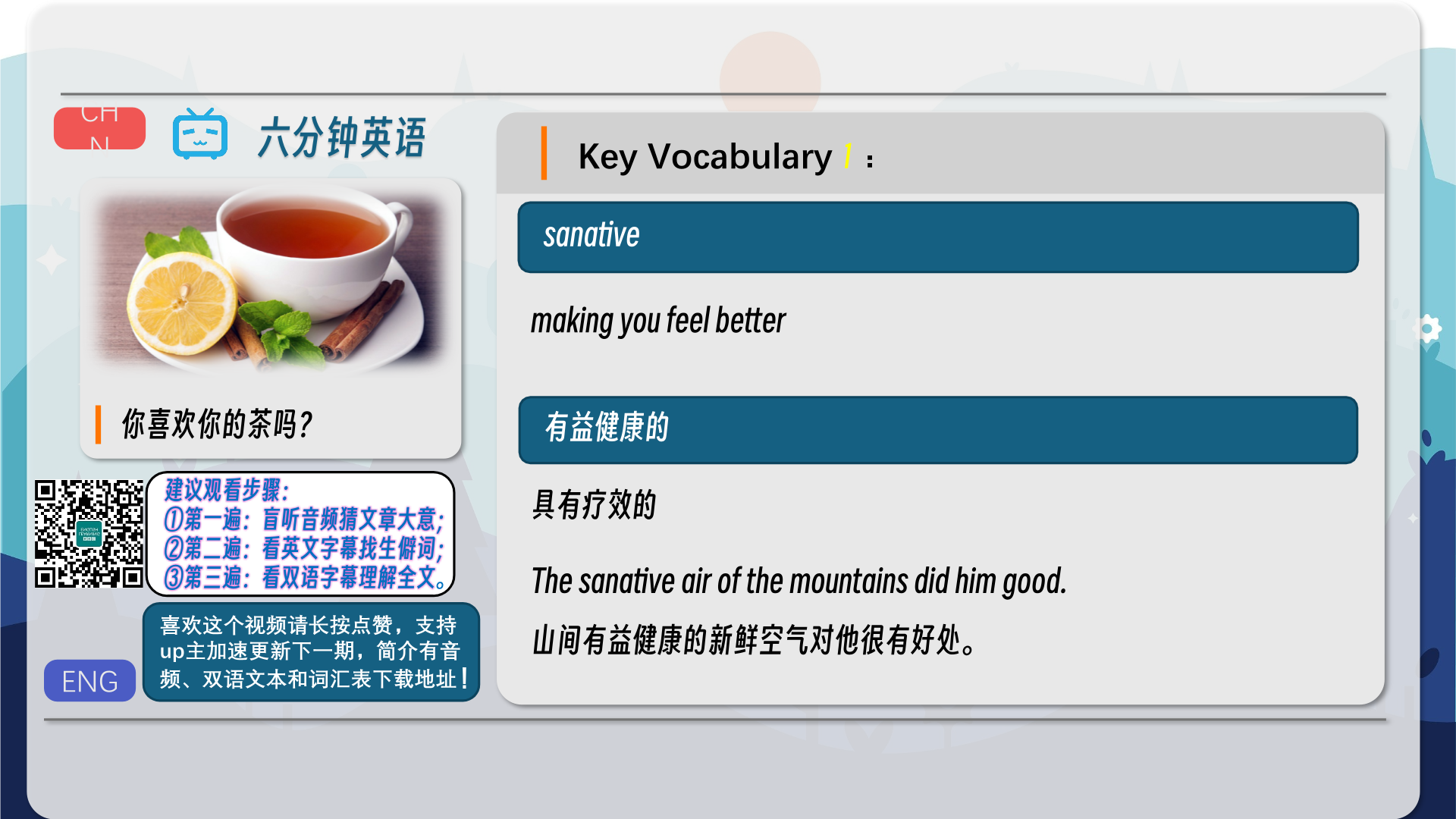
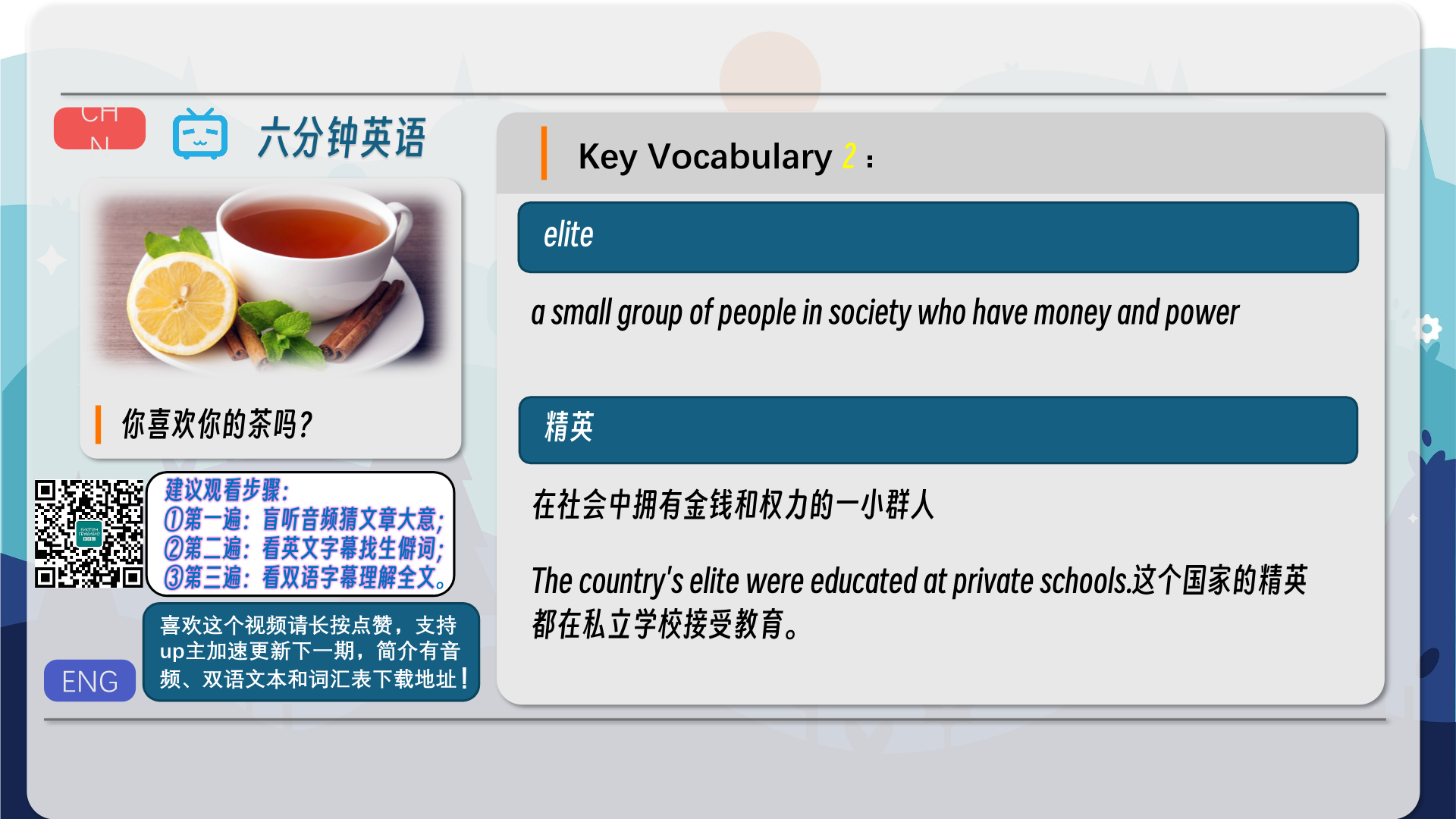
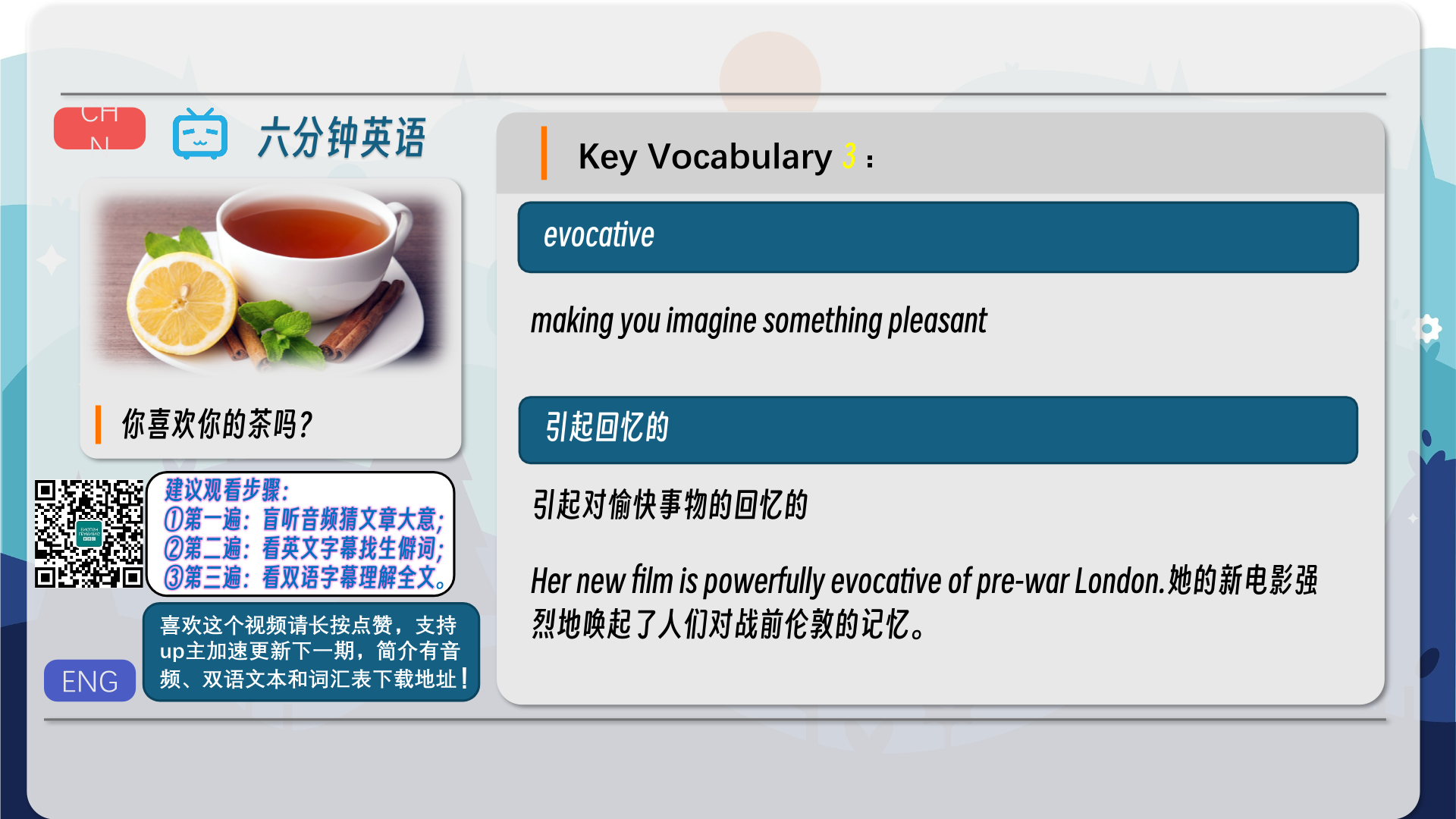
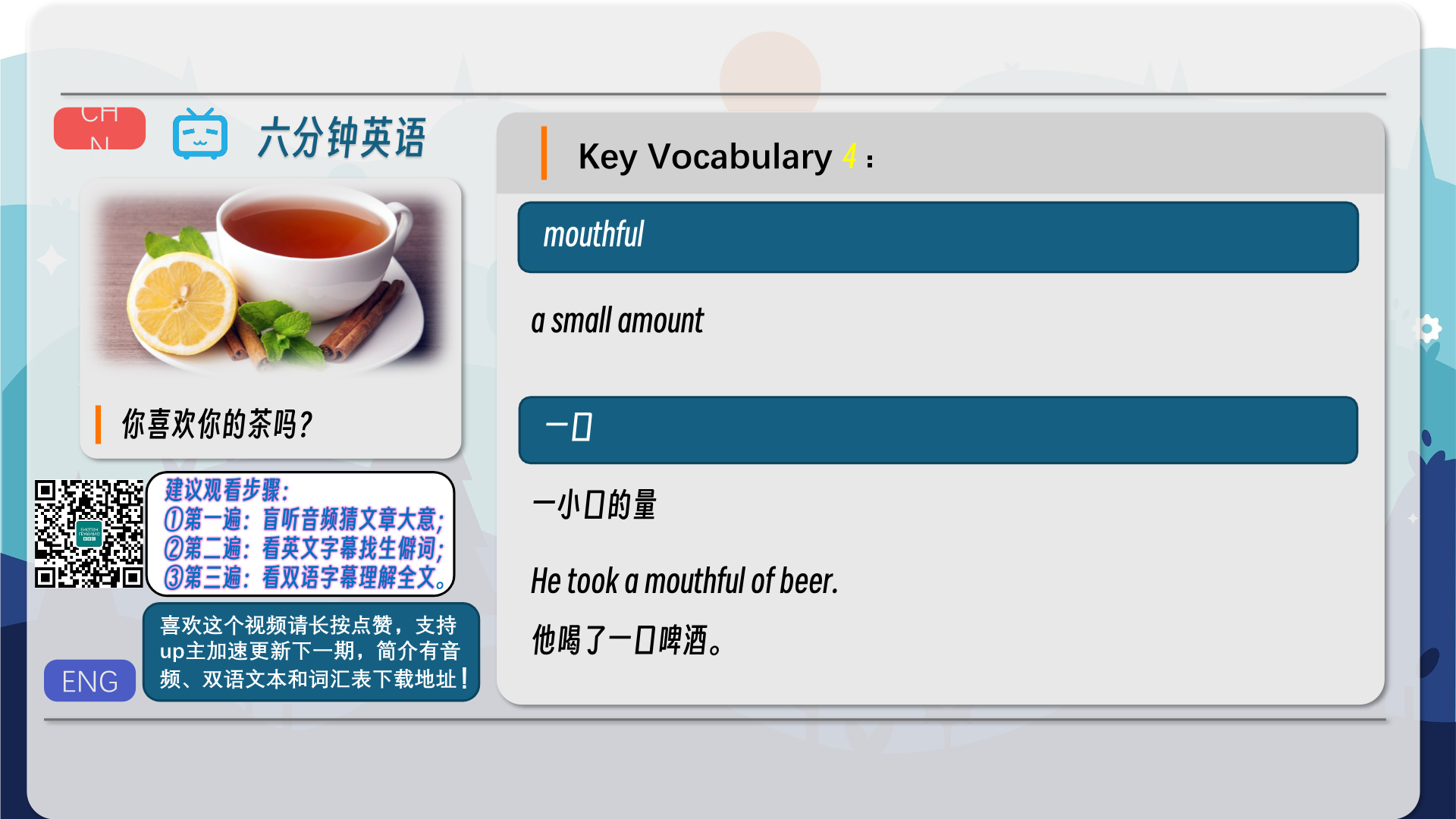
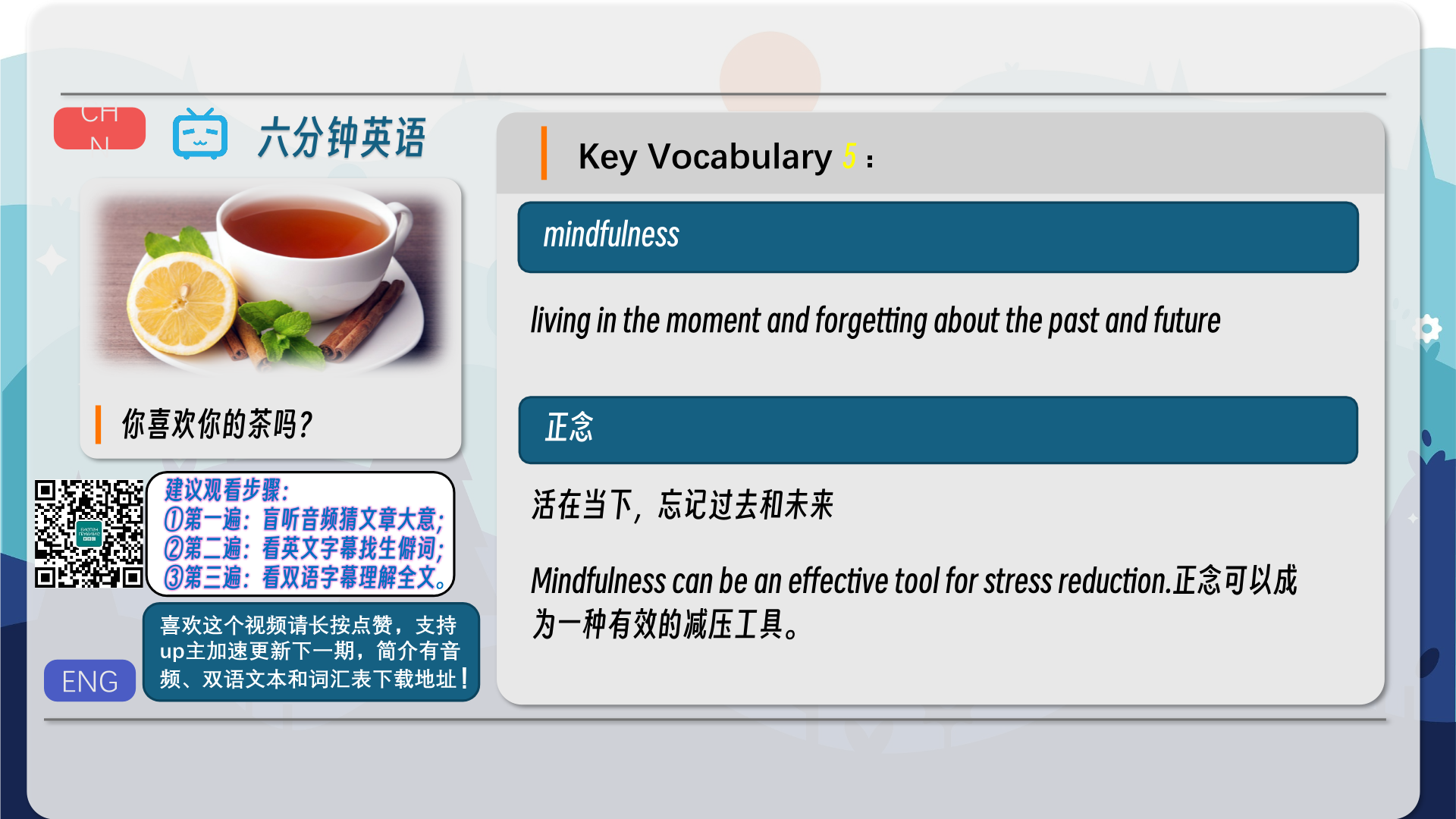
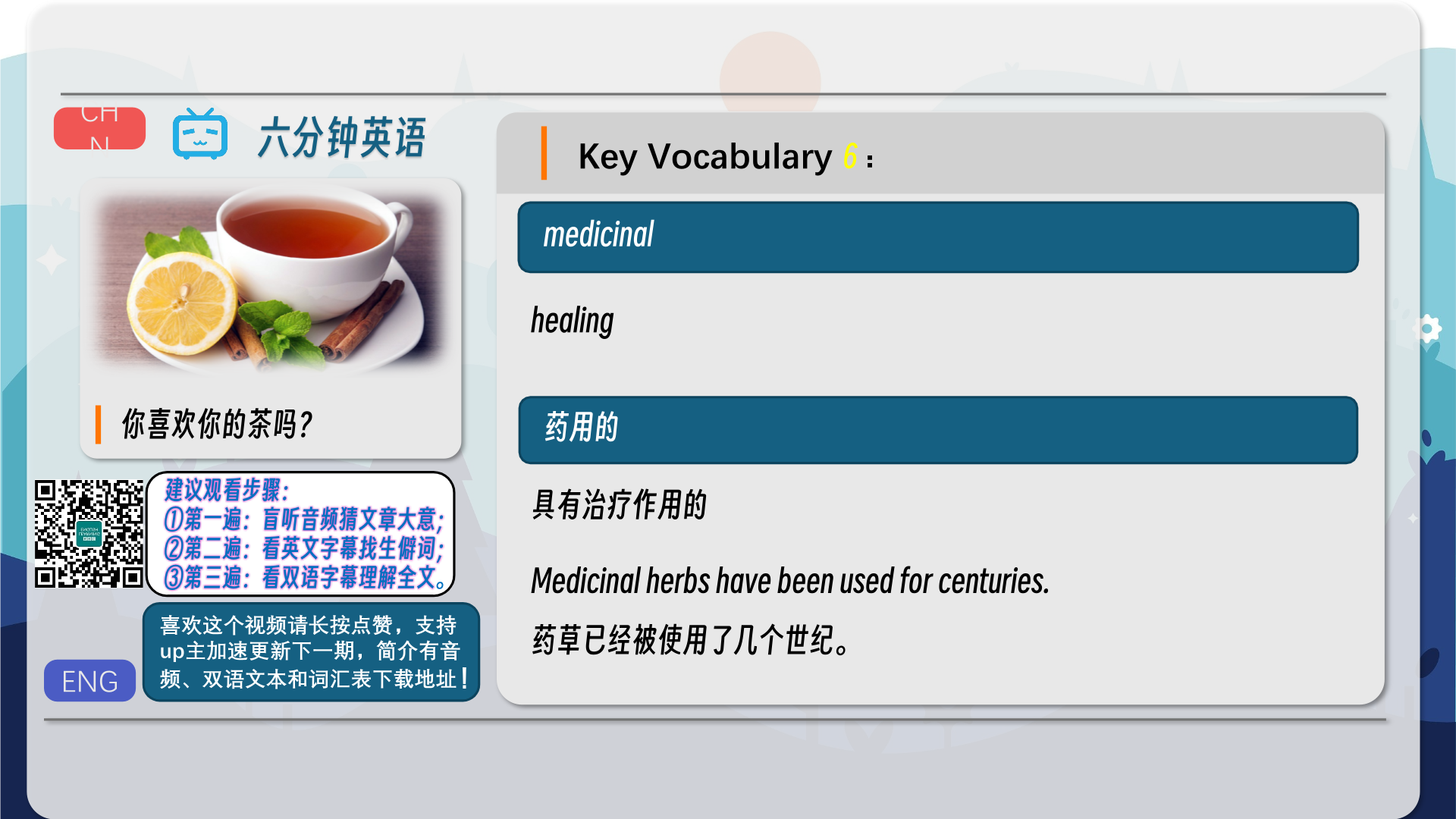
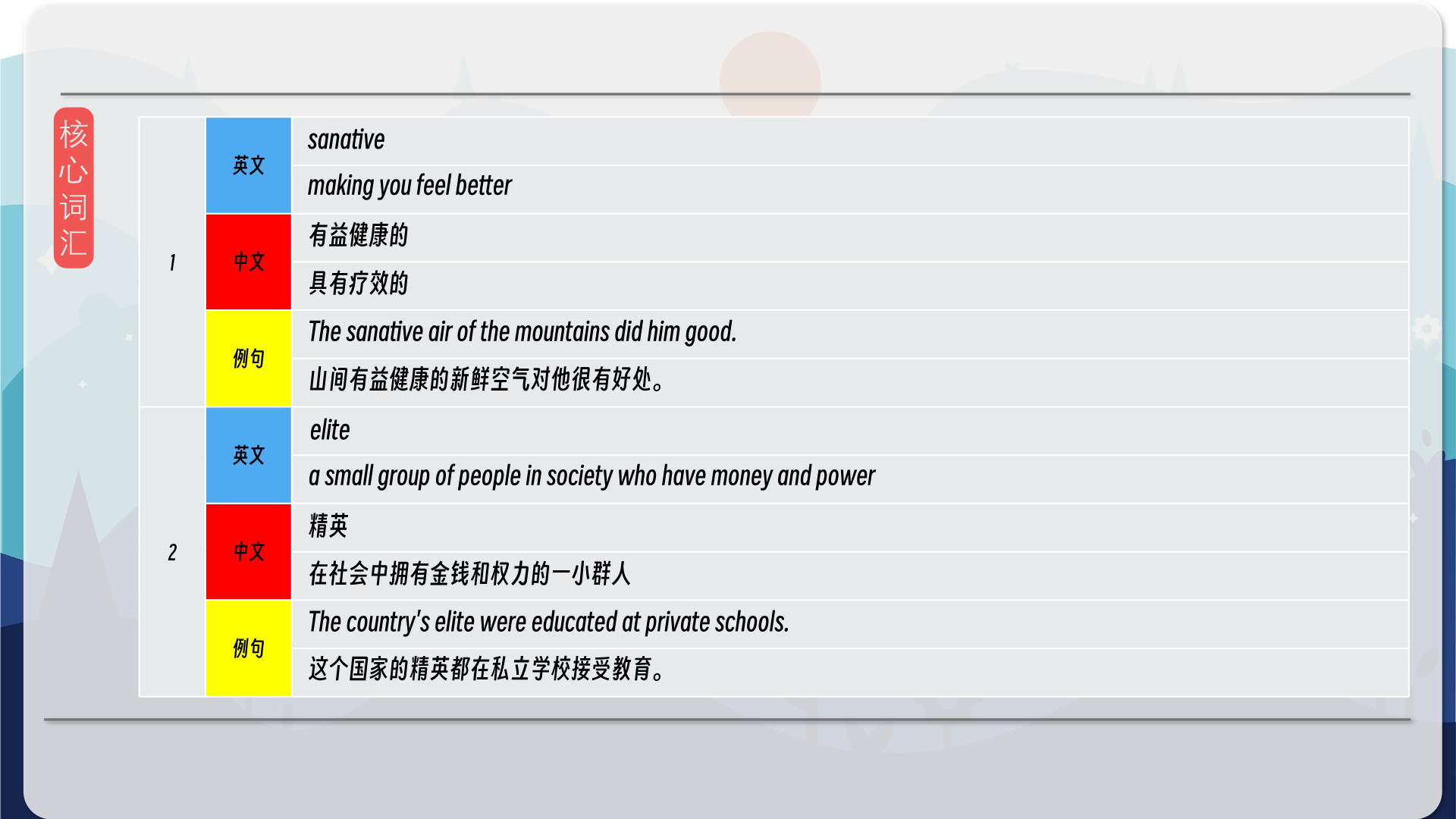
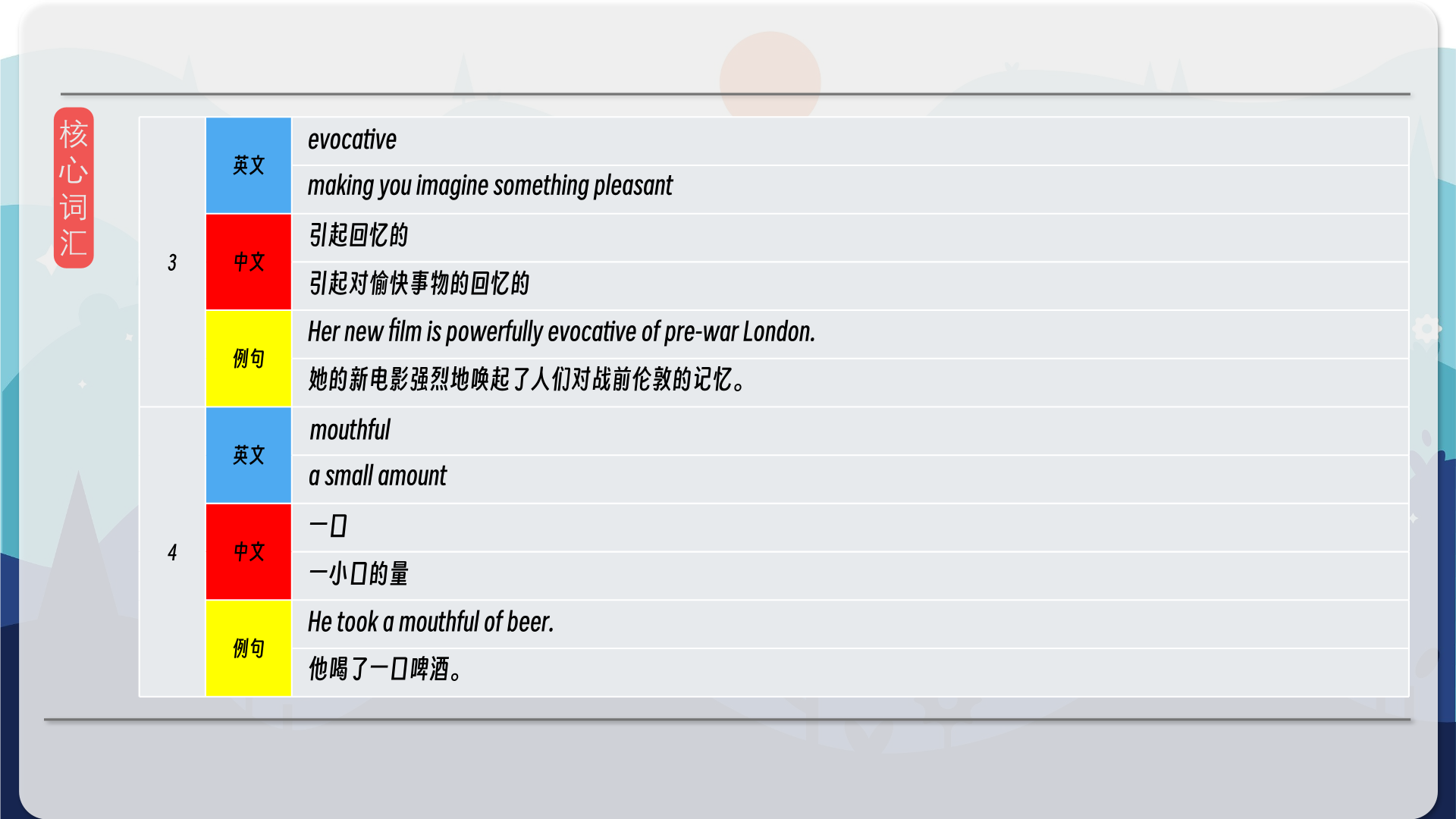
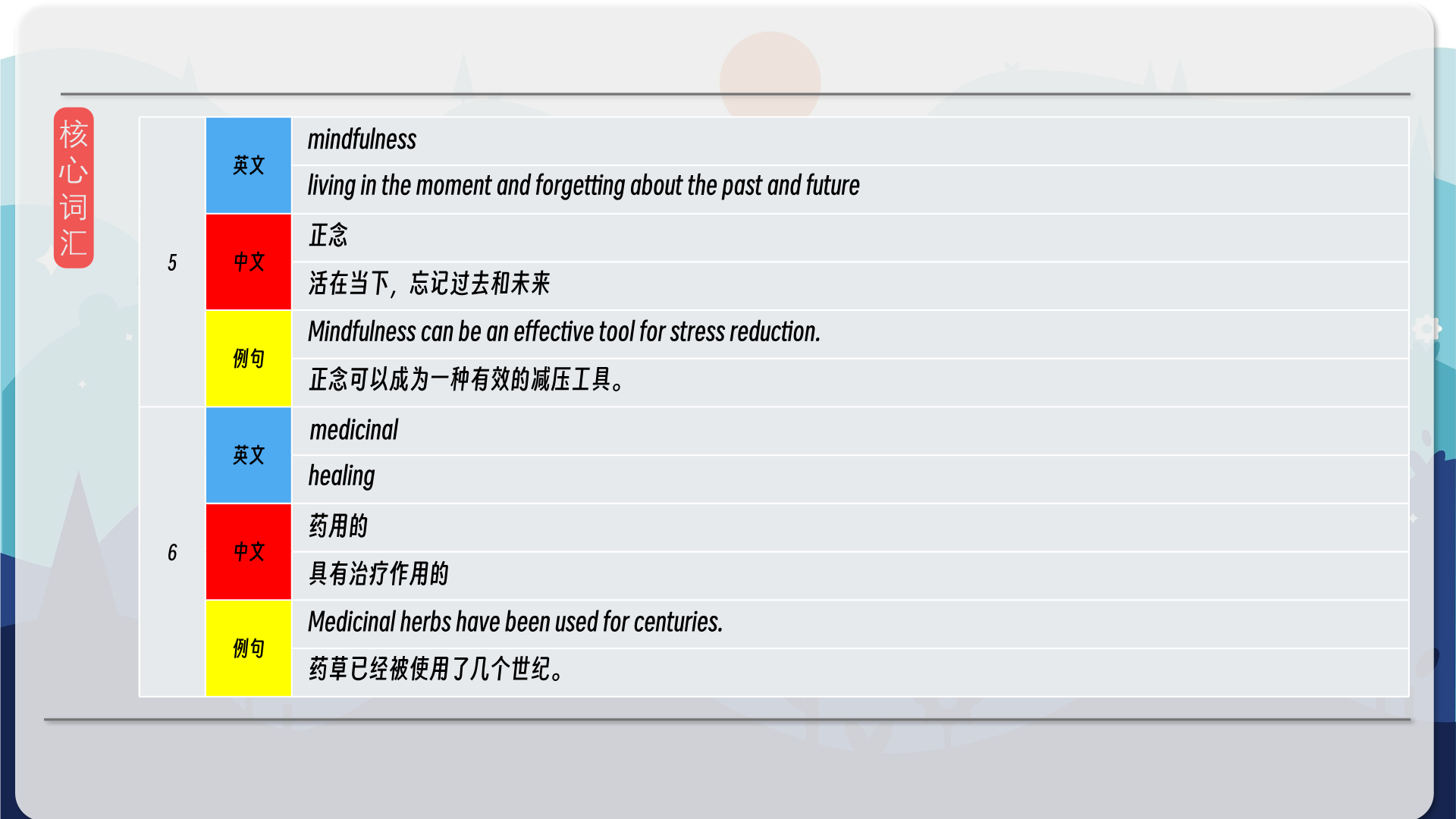
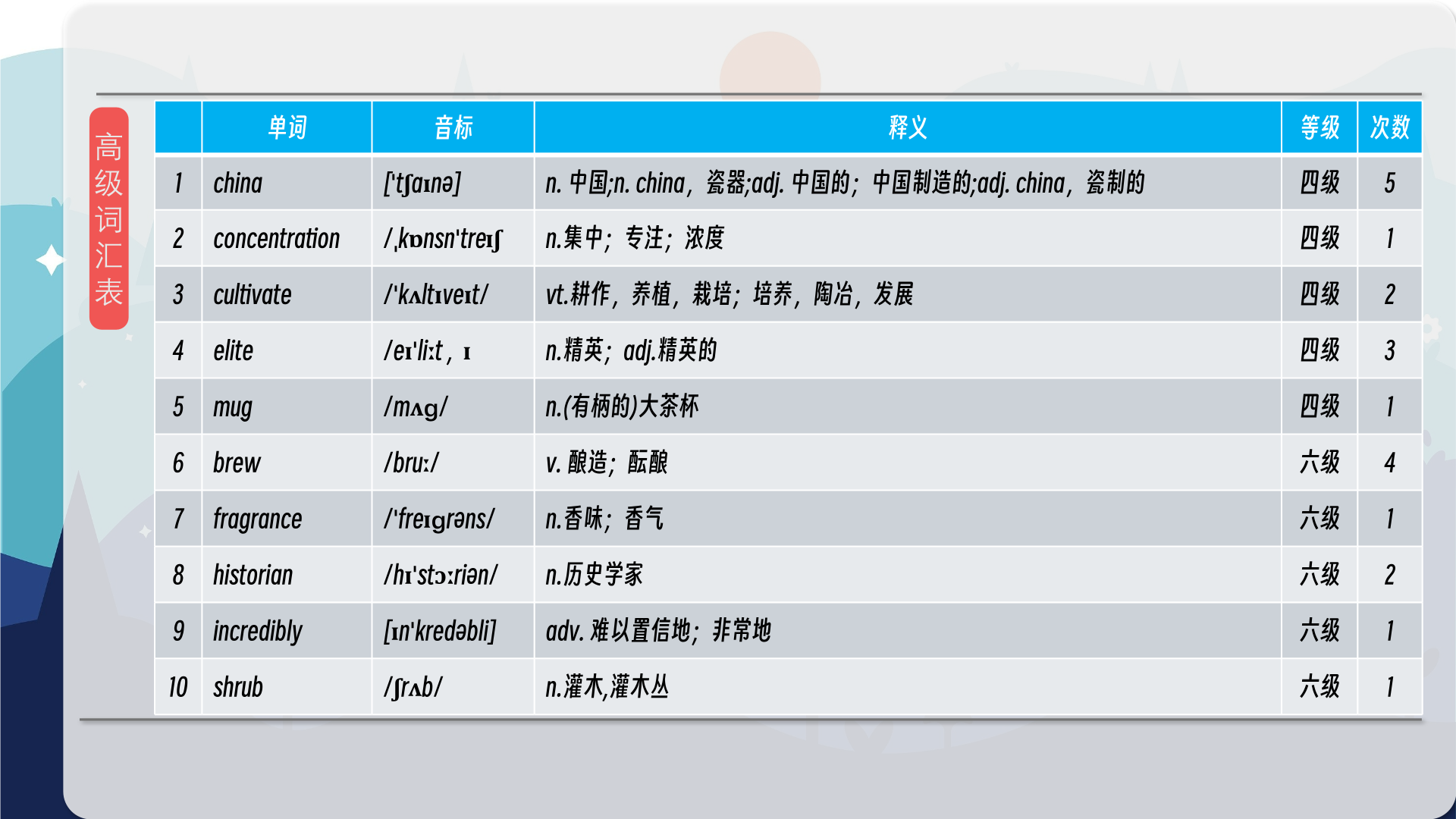
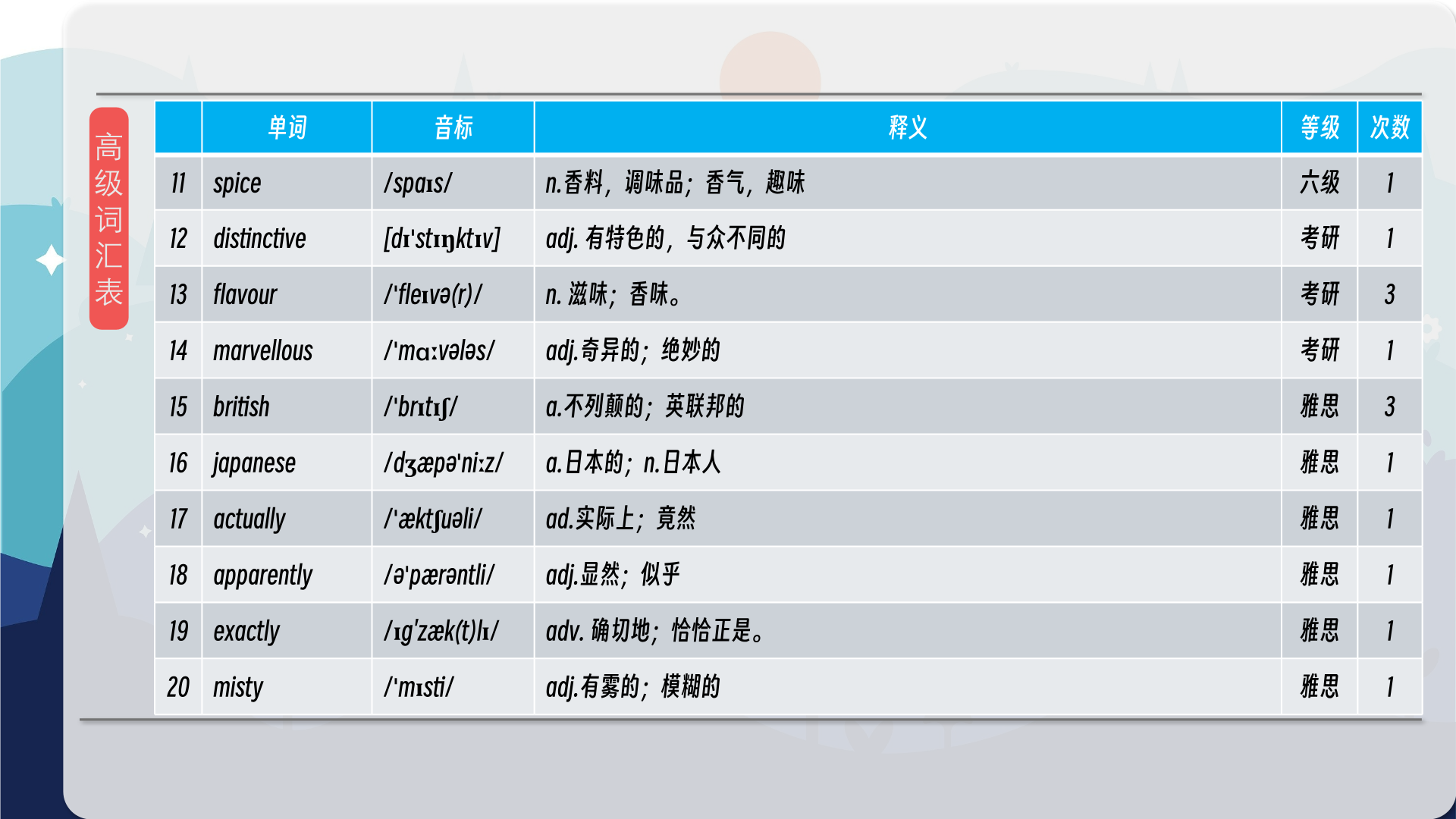
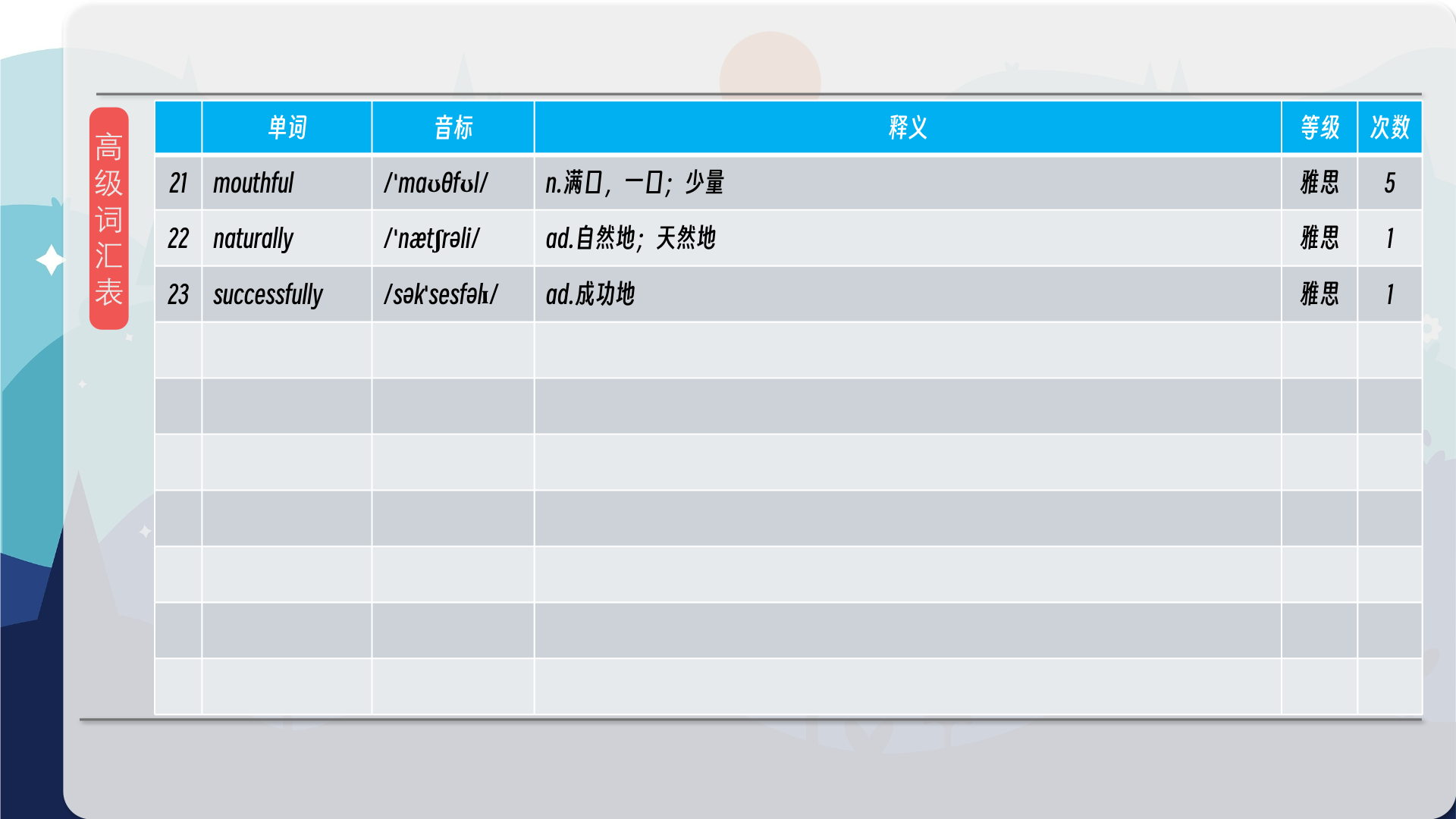

【核心词汇】
sanative
making you feel better
有益健康的
具有疗效的
The sanative air of the mountains did him good.
山间有益健康的新鲜空气对他很有好处。
elite
a small group of people in society who have money and power
精英
在社会中拥有金钱和权力的一小群人
The country’s elite were educated at private schools.
这个国家的精英都在私立学校接受教育。
evocative
making you imagine something pleasant
引起回忆的
引起对愉快事物的回忆的
Her new film is powerfully evocative of pre-war London.
她的新电影强烈地唤起了人们对战前伦敦的记忆。
mouthful
a small amount
一口
一小口的量
He took a mouthful of beer.
他喝了一口啤酒。
mindfulness
living in the moment and forgetting about the past and future
正念
活在当下,忘记过去和未来
Mindfulness can be an effective tool for stress reduction.
正念可以成为一种有效的减压工具。
medicinal
healing
药用的
具有治疗作用的
Medicinal herbs have been used for centuries.
药草已经被使用了几个世纪。
在公众号里输入6位数字,获取【对话音频、英文文本、中文翻译、核心词汇和高级词汇表】电子档,6位数字【暗号】在文章的最后一张图片,如【220728】,表示22年7月28日这一期。公众号没有的文章说明还没有制作相关资料。年度合集在B站【六分钟英语】工房获取,每年共计300+文档,感谢支持!